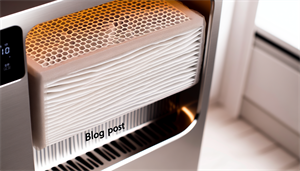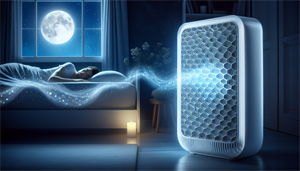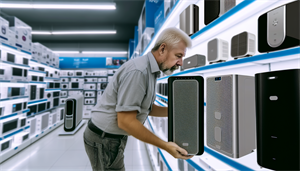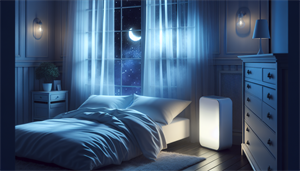Do air purifiers help with snoring? Can they be the secret to snoring less at night? Simply put, they can. Air purifiers help with snoring by removing airborne irritants that trigger nasal congestion and inflammation—common culprits behind those nighttime sounds. This article delves into the link between air purifiers and snoring, helping you understand how breathing easier at night could be just a filter away.
Key Takeaways
-
Air purifiers can help reduce snoring by eliminating airborne irritants and allergens such as pet dander, dust, pollen, and smoke, which often cause nasal congestion and throat irritation.
-
Air purifiers equipped with HEPA filters are particularly effective in capturing a wide range of harmful particulate matter, potentially clearing the airways and reducing snoring, while those with activated carbon filters can also neutralize odors for a more comfortable sleep environment.
-
Choosing the right air purifier involves considering factors such as the presence of true HEPA filters, noise levels suitable for sleep, additional features to enhance sleep, and ensuring proper placement and regular maintenance to maximize air quality improvements.
The Connection Between Snoring and Air Quality

First, it’s essential to comprehend the relationship between snoring and air quality. Snoring is often caused by the vibration of respiratory structures due to obstructed airflow. Factors such as allergens and irritants present in our indoor air can contribute to this obstruction, leading to snoring. Hence, a key to a peaceful night’s sleep could be as simple as improving the quality of the air we breathe.
Air purifiers can be a potential solution to this issue. They work by removing pollutants such as:
-
pet dander
-
dust
-
pollen
-
spores
-
bacteria
-
cigarette smoke
from our indoor environment. These pollutants are known irritants that can contribute to snoring by causing throat irritation, nasal congestion, and watery eyes. Thus, employing an air purifier to purify our indoor air can foster a more conducive environment for uninterrupted sleep.
Allergens and Irritants
Delving into the details, we should focus on allergens and irritants. These airborne particles can cause nasal congestion and inflammation, which can contribute significantly to snoring. In fact, most air purifiers are designed to remove these allergens and irritants, promoting better sleep by creating an environment that is free of substances that can cause respiratory irritation.
Air purifiers enhance the improved air quality by eliminating allergens and particles like:
-
dust
-
pet dander
-
mold spores
-
VOCs
Air purifiers can potentially reduce nasal congestion by effectively removing irritants that cause discomfort and disruptions, such as snoring, leading to a better night’s sleep.
Sleep Apnea and Air Quality
Sleep apnea, a serious sleep disorder, can also be impacted by poor quality air. In individuals with obstructive sleep apnea, breathing repeatedly stops and starts during sleep, often leading to poor sleep and intense snoring. Poor air quality, laden with allergens and irritants, can exacerbate this condition, leading to more frequent disruptions and louder snoring.
However, while air purifiers can help create better air quality by removing airborne allergens and irritants, it’s important to note that they are not specifically tailored to directly address snoring caused by sleep apnea. That said, running an air purifier throughout the night can be beneficial as it helps maintain a clean air environment, which may potentially reduce snoring-related disturbances.
How Air Purifiers Can Help Reduce Snoring

Considering the link between air quality and snoring, it’s vital to grasp how air purifiers could lessen snoring. As we’ve already discussed, air purifiers work by removing allergens and irritants from the air, effectively reducing nasal congestion and inflammation, which can lead to snoring. In addition to this, air purifiers also neutralize odors, creating a more comfortable sleep environment.
The efficiency of snoring air purifiers in minimizing snoring isn’t just theoretical but is supported by scientific research. A study published in the Journal of Sleep Medicine found that participants using air purifiers saw a 50% reduction in their snoring frequency. By running an air purifier throughout the night, the bedroom air remains clean, potentially reducing snoring-related disturbances and enhancing sleep quality.
Removing Airborne Particles

Air purifiers equipped with High-Efficiency Particulate Air (HEPA) filters are particularly beneficial for those suffering from snoring. These filters are designed to:
-
Capture airborne particles and pollutants
-
Reduce nasal congestion and inflammation
-
Lead to clearer breathing passages
-
Reduce instances of snoring during the night
HEPA filters can capture various harmful particles like:
-
pollen
-
pet dander
-
dust mites
-
tobacco smoke
These are common allergens and irritants found in indoor air. By efficiently eliminating these allergens from the air, air purifiers with HEPA filters can significantly enhance sleep quality, resulting in a decrease in snoring.
Neutralizing Odors
In addition to removing airborne particles, air purifiers with activated carbon filters can help eliminate odors, creating a more comfortable sleep environment. Activated carbon filters are designed to effectively remove volatile organic compounds (VOCs), odors, and other gaseous pollutants from the air.
By removing these disagreeable odors, air purifiers foster a more peaceful and comfortable sleep environment. This can be highly advantageous if odors or irritants in your bedroom are intensifying your snoring.
Choosing the Right Air Purifier for Your Needs

Having recognized the advantages of air purifiers in lessening snoring, the subsequent step is to select an appropriate air purifier that suits your needs. The perfect air purifier for you will depend on various factors, including the presence of true HEPA filters, the noise levels, and additional features that can enhance the air purifier’s functionality.
It’s important to remember that not all air purifiers are created equal. Different models excel in different areas, and some features may be more beneficial to you than others. For example, if you’re a light sleeper, you might prefer an air purifier with a ‘sleep mode’ feature that reduces noise levels.
True HEPA Filters
True HEPA filters are recommended for effectively removing airborne particles that contribute to snoring. These filters are designed to capture up to 99.97% of airborne pollutants, including small particles responsible for airway irritation.
By eliminating these particles, true HEPA filters can help alleviate snoring, resulting in a more restful sleep. So, when choosing your air purifier, consider looking for models that feature true HEPA filters to maximize its effectiveness in reducing snoring.
Noise Levels
Noise levels are another important factor to consider when choosing an air purifier. The recommended noise level for an air purifier to operate without disturbing sleep is around 50 decibels, which is equivalent to the sound of a normal conversation.
Additionally, some air purifiers feature a ‘sleep mode’, which can further reduce noise levels for a more restful night’s sleep. Therefore, if you’re a light sleeper or easily disturbed by noise, it’s worth considering an air purifier with a noise level that suits your needs.
Additional Features
Beyond the noise levels and filter types, there are additional features that can enhance the benefits of an air purifier for sleep. One such beneficial feature is white noise generation. The white noise generated by the air purifier can mask disruptive sounds in the environment, promoting a more restful sleep.
Another feature you may find beneficial is a timer setting. This allows you to schedule the air purifier running at specific times, ensuring clean air during your sleep and upon waking up, promoting a more restful and healthy sleep routine.
Tips for Maximizing the Benefits of Your Air Purifier
While selecting the right air purifier and understanding its benefits is crucial, it’s equally important to know how to maximize its effectiveness. This includes proper placement, regular maintenance, and creating a sleep-friendly environment.
Correct positioning of the air purifier in your bedroom guarantees optimum air circulation and filtration. Concurrently, routine maintenance activities like cleaning or replacing filters are critical in preserving the air purifier’s efficiency. On top of that, creating a sleep-friendly environment, including using allergy-free bedding and keeping windows closed, can complement the benefits of an air purifier.
Proper Placement
Proper placement of the air purifier in the bedroom is crucial for its effectiveness. The air purifier should be placed as close to the head of the bed as possible but within 6-10 feet to ensure optimal air filtration.
Also, the air purifier should be positioned at a height that prevents it from drawing in floor dust, and the inlet must be at least 15 cm away from the wall to ensure proper air intake and circulation. By considering these factors, you can ensure your air purifier works optimally to improve your sleep quality and reduce snoring.
Regular Maintenance
Maintaining your air purifier regularly is essential for its effectiveness. This includes cleaning or replacing filters as required. For example:
-
HEPA filters are typically replaced every 3 years
-
Pre-filters should be replaced every 1 to 3 months
-
Carbon filters should be replaced every 3 to 6 months
Cleaning air purifier filters involves the following steps:
-
Remove the filters from the air purifier.
-
Use a vacuum with a brush attachment to remove any lint or debris from the filters.
-
If applicable, wash the filters with warm water and mild detergent.
-
Allow the filters to air-dry completely before reinstalling them.
By keeping your air purifier in good working order, it ensures efficient filtration of particles and allergens, contributing to a reduction in snoring.
Creating a Sleep-Friendly Environment

Creating a sleep-friendly environment can complement the benefits of an air purifier. This involves using allergy-free bedding to prevent the accumulation of allergens like dust mites, improving comfort, and making breathing easier.
Moreover, keeping windows closed can be helpful in preventing additional outdoor allergens from entering the bedroom and exacerbating snoring. By creating a sleep-friendly environment, you can maximize the benefits of your air purifier and enjoy a more restful sleep.
Real-Life Success Stories: How Air Purifiers Have Helped Others with Snoring
To further emphasize the advantages of air purifiers, let’s consider some actual success stories. Numerous individuals have reported a notable decrease in snoring after incorporating air purifiers into their sleeping spaces. These success stories demonstrate enhancements in air quality, and consequently, improved sleep quality.
For instance, a participant in a study published in the Journal of Sleep Medicine reported a 50% reduction in snoring frequency after using an air purifier. Another case study reported that by enhancing air quality and eliminating dust and particles, air purifiers helped in relieving nasal congestion, a common cause of snoring. These stories underline the potential benefits of air purifiers in reducing snoring and enhancing sleep quality.
Summary
In conclusion, air purifiers can play a significant role in reducing snoring and improving sleep quality. By removing airborne allergens and irritants and neutralizing odors, air purifiers can alleviate the factors that lead to snoring. They are efficient tools in enhancing air quality, thus providing an environment conducive to peaceful sleep.
By choosing the right air purifier for your needs, maintaining it properly, and placing it correctly, you can maximize its benefits and potentially transform your sleepless nights into peaceful slumbers. If you or someone you know is struggling with snoring, consider investing in an air purifier - it could be the key to a good night’s sleep!
Frequently Asked Questions
Is it good to sleep with air purifier?
Yes, it's good to sleep with an air purifier because it can capture various particles and improve the overall air quality in your bedroom. This can help enhance your sleep quality.
Is it OK to leave the air purifier on all night?
Yes, it is generally okay to leave an air purifier on all night to maintain clean air in a room. Just be sure to follow the manufacturer's instructions for safety.
How long does it take for an air purifier to be effective?
An air purifier can take about 30 minutes to two hours to purify a room, effectively reducing the impact of indoor air pollution.
Will an air purifier help with breathing?
Yes, an air purifier can help with breathing by reducing contaminants known to exacerbate lung problems and respiratory illnesses. Running a high-quality air purifier can improve indoor air quality and provide significant health benefits.
Can air purifiers help reduce snoring?
Yes, air purifiers can help reduce snoring by removing airborne allergens and irritants, which can alleviate nasal congestion and inflammation.
No Comments

